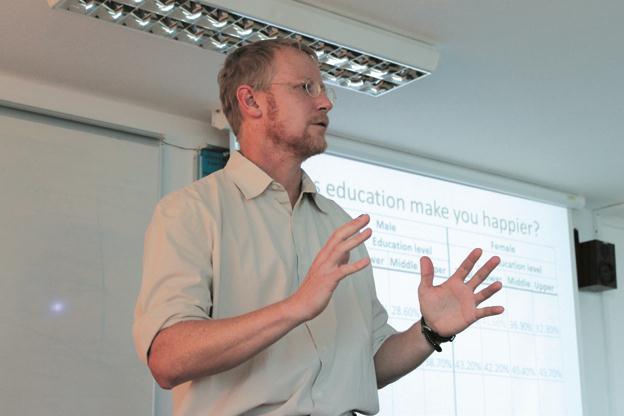Fallacies, Psychology and Vikings: World Philosophy Day at Bilkent
Photograph by Bikem Ahıska (IR/I)
Last week, on November 22-23, Bilkent University students and faculty alike celebrated UNESCO World Philosophy Day (actually designated as November 15 this year) with a two-day series of lectures in a joint effort by the Department of Philosophy and the Bilkent Philosophy Society.
A workshop on logical fallacies, both in the context of formal logic and as made during everyday conversations, was held on the first day of activities. After an introduction to validity and soundness of inferences by Asst. Prof. Hilmi Demir and an overview by Dr. Robin Turner of the fallacies most commonly observed in daily life, the mini-workshop concluded with a game in which participants were asked to intentionally construct a particular logical fallacy while avoiding others. Given the human propensity to commit unintentional fallacies, this trivial-sounding objective quickly proved to be a Herculean task.
The theme chosen for World Philosophy Day 2012, "Future Generations," was the focus of the second day's talks. Following a brief introduction by Prof. Varol Akman, Asst. Prof. Simon Wigley summarized the recent accomplishments and failings of Turkey with regard to the gender gap in education, underlining the fact that higher percentages of girls attending primary or higher education do not necessarily translate to higher percentages of girls learning (or, for that matter, earning) more from the experience. Despite completing compulsory education, girls in Turkey, for reasons that are unclear, still do not fare as well in certain areas of standardized tests, and a marked lack of workplace equality remains despite the improvements in school attendance.
Dr. Wigley then discussed the possible reasons for and implications of these trends, as well as potential solutions (and non-solutions, for one plausible-sounding approach in fact suggests that we should abandon education altogether).
Asst. Prof. William Wringe then gave an account of the mutual but sometimes unintentionally misleading relationship between developmental psychology and philosophy. He cautioned those in both fields against delving into the other without expert knowledge: while an interdisciplinary approach with collaborating parties can benefit research in both areas, outdated concepts and misunderstandings can cause substantial difficulties for an unwary psychologist or philosopher acting alone in the domain of the other field. Dr. Wringe thus argued for exercise of caution, providing examples of instances in which developmental psychologists utilized clearly conflicting ideas or misunderstandings of philosophical concepts to justify experimentation or explain curious cases, where a philosopher could have easily identified the error; and, on the other hand, instances in which philosophical ideas running counter to experimentally demonstrated facts were proposed without awareness of the experiments in question, where a developmental psychologist would have been aware of and able to provide the necessary proof.
The second day concluded with Asst. Prof. Sandrine Berges's vivid illustration of how historical stereotypes, such as Viking raiders being violent, almost exclusively male warriors with a penchant for murder and pillage, may turn out not to be true after all -- it is now known that Vikings had an almost equal gender ratio, the warriors having been accompanied on their ships by their wives -- and how similar stereotypes of exclusive male dominion may block women from advancing in such areas as philosophy, mathematics and physics. After pointing to examples where female philosophers from throughout history have been almost completely ignored in compilations of both ancient and modern philosophy, Dr. Berges then discussed how current paradigms in the history of philosophy, firmly established to the point of calcification, should be reconsidered to offer a more balanced and historically accurate view for future generations.
BY ALPER ÖZKAN (MSN/PhDII)
